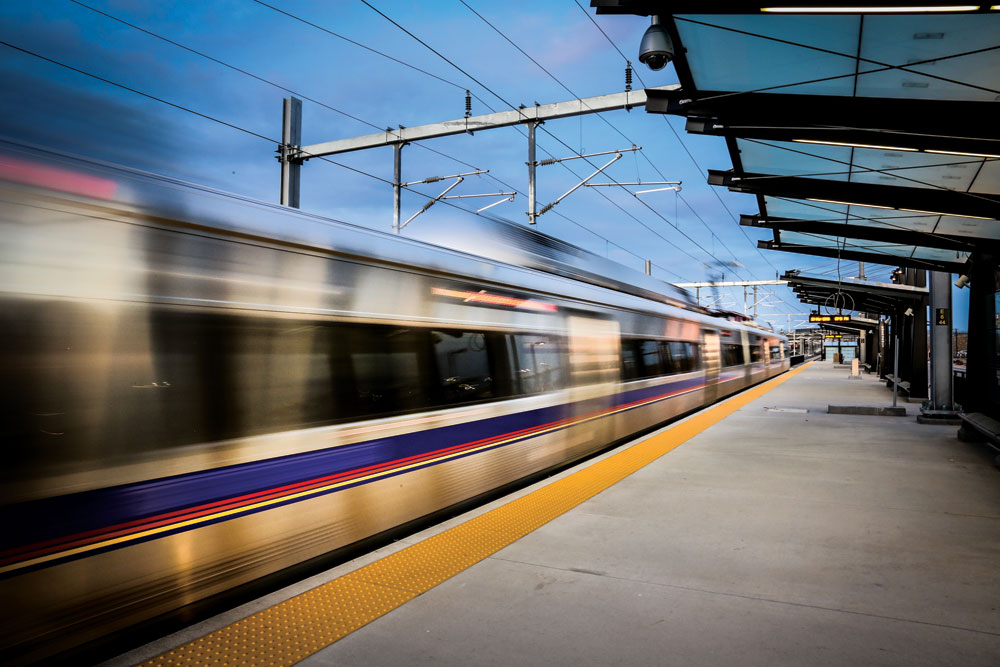
An A Line train moves through Central Park Station at twilight.
An early February decision by the Federal Railroad Administration is expected to grant an additional “operational waiver” for RTD’s A Line. This would allow the commuter rail line to continue to operate without a fully certified “Positive Train Control” system. Until the PTC is certified by the federal government, the trains will sound their horns when approaching all 13 street crossings along the line that runs between Denver Union Station and Denver International Airport.
Documents used by RTD in a presentation to FRA in December suggest an estimate of six months from the previous waiver, granted in early November, to work out problems with the PTC that are causing crossing arm gates to descend too early and rise later than design standards require. That suggests it will be May before the PTC system can be certified. RTD cannot apply for quiet zone status for the A Line until certification is achieved. That process takes another 60 to 90 days. A quiet zone is allowed by federal rule when certain safety standards are met at crossings. Those include gates, medians, signage, bells and lights, all of which have been installed on the A Line. Once approved, freight trains, as well as the commuter rail vehicles, can run silently through the crossings.
RTD spokesperson Nate Currey told the Front Porch it would be a “reasonable inference” to conclude that the A Line will not run quiet for at least six more months. Currey said RTD and its A Line concessionaire, Denver Transit Partners, are making “significant progress” with software fixes that are bringing the gate crossings closer to meeting the requirement that gates achieve the raising and lowering times 90 percent of the time.
RTD has recently begun testing the PCS as a system along its entire 23-mile length with empty trains that run in between the late evening trains that depart Denver Union Station every 30 minutes.
Since the most recent 90-day waiver was granted on Nov. 5, the A Line has been forced to operate with flaggers at all the grade crossings. Currey expects the FRA will require the flaggers to continue until the PCS is certified. DTP is incurring that expense along with penalty payments at the rate of $250,000 a month for the A Line and $100,00 a month for the B Line for failing to meet performance standards. Communities along the G Line are suffering as well because the FRA will not allow train testing on that line to even begin until the PTC serving the A and B Lines is certified. G Line service to Arvada and Wheat Ridge was supposed to have begun before the end of 2016.
Despite the troubles, Currey says ridership remains strong at just more than 18,000 riders a day. He says on-time performance is “steady”, clocking in at 85.3% for December, a bit below the six-month average of 87.1%.
A Line passengers have experienced one other form of delay: trains slowing down as they approach broken rail. Currey says cracks in the rail have appeared in three places: just north of Pena Boulevard, just east of Central Park Station and at one location on the B Line. He says cracks like this are not unusual in a new system and were in fact detected by the PTC system. The cracks are repaired with a temporary joint bar before the damaged section is cut out and replaced. Currey says such cracks are not unusual in a new system and result from normal stress accentuated by the extreme temperature swings common in Colorado.
Editors Note: RTD plans to hold a press conference about the latest waiver extension request in early February. The Front Porch will report on that press conference on our Facebook page and web site.




Continued unfathomable incompetence. It’s obviously not costing the city enough or it would be fixed by now. What’s to stop them from operating under continued FRA extensions for a year, 2 years, five years? Wonder if we can we lobby the FRA to stop this madness?
I agree with you Ted. With the expense that it’s costing for extra staffing etc. they could have put in overpasses. The US not just Denver really fail short on public transport systems . Unlike Japan the U.K. and other regions of the world.
This is so typical of Denver’s mismanagement. Remember the DIA baggage system? “Thanks mainly to problems with the baggage system, the airport’s opening was delayed by a full 16 months. Expenditure to maintain the empty airport and interest charges on construction loans cost the city of Denver $1.1 million per day throughout the delay.”
It’s deja vu all over again!
http://www.bizjournals.com/denver/blog/broadway_17th/2015/02/dia20-the-high-techairport-baggage-system-that.html